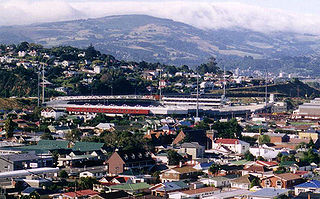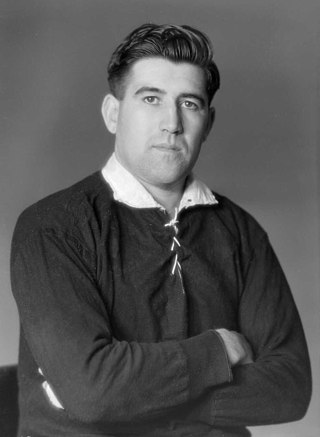Related Research Articles

The Highlanders is a New Zealand professional rugby union team based in Dunedin that compete in Super Rugby. The team was formed in 1996 to represent the lower South Island in the newly formed Super 12 competition,and includes the Otago,North Otago and Southland unions. The Highlanders take their name from the Scottish immigrants that founded the Otago,North Otago,and Southland regions in the 1840s and 1850s.

Carisbrook was a major sporting venue in Dunedin,New Zealand. The city's main domestic and international rugby union venue,it was also used for other sports such as cricket,football,rugby league and motocross. In 1922,Carisbrook hosted the first international football match between Australia and New Zealand. The hosts won 3-1.

The Otago cricket team,nicknamed the Volts since the 1997–98 season,are a New Zealand first-class cricket team which first played representative cricket in 1864. The team represents the Otago,Southland and North Otago regions of New Zealand's South Island. Their main governing board is the Otago Cricket Association which is one of six major associations that make up New Zealand Cricket.

The Otago Rugby Football Union is the official governing body of rugby union for the Otago region of New Zealand. The union is based in the city of Dunedin,and its home ground is Forsyth Barr Stadium. The top representative team competes in the ITM Cup,New Zealand's top provincial competition. The union was to have been liquidated in March 2012. However a deal involving the Dunedin City Council allowed it to keep operating. Otago have won the Ranfurly Shield on seven occasions. They were the National provincial championship winners in 1991 and 1998. They have a proud record playing international teams,having defeated South Africa and the British and Irish Lions.
John Robert Nimmo was a New Zealand cricketer. He played two first-class matches for Otago,one in each of the 1933–34 and 1936–37 seasons.

William Nicol Carson was a New Zealand sportsman who represented his country at both cricket and rugby union.
William Henry Tracey Campbell Penney Vallange was an English cricketer and medical doctor who played one first-class match in New Zealand for Otago.
Alfred George Eckhold was an Australian-New Zealand sportsman who played first-class cricket for Otago and represented the All-Blacks at rugby union.
Victor George Cavanagh,known as "Young Vic" Cavanagh,was a New Zealand rugby union administrator. He was born at Caversham in Dunedin in 1909,the son of "Old Vic" Cavanagh. Between them,they had a major impact on the development of the sport of rugby union within New Zealand.

John Burns Smith was a New Zealand rugby union player,soldier,sportsman and baker. He was an All Black captain,and despite only playing nine matches is recognised as a great. His 26 appearances for the Second New Zealand Expeditionary Force rugby team,which toured the UK in 1946–47,earned him high praise. He also played for the New Zealand Māori,being of Ngāpuhi descent.

James Clark Baker,also known as James Clark,was an English-born New Zealand cricketer who played first-class cricket for Otago between the 1889/90 and 1906/07 seasons. Baker was born at London in England. In 1902 he scored Otago's first century in first-class cricket.
Ata Mamea Matatumua is a former Samoan cricketer who played in New Zealand domestic competitions in the 1960s. His first-class career consisted of eight matches for Otago.
Clement Henry Beck was a New Zealand cricketer. He played seven first-class matches for Otago between the 1884/85 and 1890/91 seasons.
Reginald Clive Bell was a New Zealand rugby union player and cricketer. He was a member of the New Zealand national rugby side,the All Blacks,in 1922,playing eight matches. He played four first-class matches for Otago between the 1914–15 and 1920–21 seasons.
Arthur Ernest Berry was a New Zealand sportsman. He played four first-class cricket matches for Otago during the 1955–56 season and played against touring international rugby union sides.
William Gordon Dixon was an English-born cricketer. He played nine first-class matches in New Zealand for Otago between the 1875–76 and 1885–86 seasons.
Allen Clyde Holden was a New Zealand cricketer. He played two first-class matches for Otago,one in each of the 1937–38 and 1939–40 seasons.
John Hope was a New Zealand sportsman. He played 22 first-class cricket matches for Otago between the 1885–86 and 1899–1900 seasons and played representative rugby union for the Otago and Southland Rugby Football Unions. He was later a prominent sports administrator in the province.
William Nelson Vorrath was a New Zealand sportsman. Vorrath played six first-class cricket matches for Otago between the 1927–28 and 1929–30 seasons and represented Otago at rugby league.
Eric Alexander Watson was a New Zealand rugby union coach and sportsman. He coached the New Zealand national rugby union team for two years,played for the Otago Rugby Football Union,represented Otago at lawn bowls,and played 46 first-class cricket matches for the Otago cricket team.
References
- 1 2 3 4 5 Luxford, Bob. "Charlie Saxton". New Zealand Rugby Union. Retrieved 17 February 2015.
- 1 2 3 McCarron A (2010) New Zealand Cricketers 1863/64–2010, p. 118. Cardiff: The Association of Cricket Statisticians and Historians. ISBN 978 1 905138 98 2 (Available online at the Association of Cricket Statisticians and Historians. Retrieved 5 June 2023.)
- ↑ "Saxton's fame reaches France". Stuff.co.nz. 18 October 2001.
- ↑ "No. 47420". The London Gazette (3rd supplement). 31 December 1977. p. 43.
- 1 2 "Rugby world loses courageous leader". Evening Post. 5 July 2001. p. 28.
- ↑ "Charlie Saxton". CricketArchive. Retrieved 17 February 2015.
- ↑ "Carisbrook mourns 'NZ icon'". The Press. 10 July 2001. p. 9.